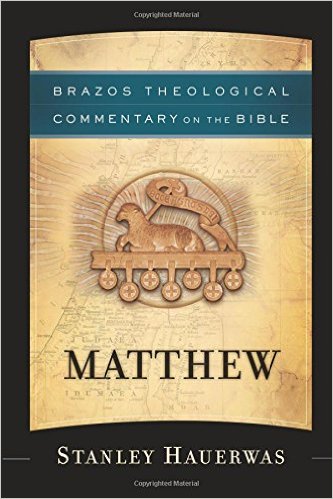 For my own benefit, I am using Stanley Hauerwas’s commentary on Matthew 1-2 to help me prepare for Christmas, and also in hope of spiritual renewal in this time of new birth. The Brazos Theological Commentary on the Bible is attentive to the biblical text, but in a theological and ecclesial rather than historical and linguistic manner. It is a different kind of commentary. Hauerwas reflects on the meaning of the Christmas story in the light of the church’s faith and for the church’s faithful response. In this week’s excerpt, he reflects on the work of the Holy Spirit in the virgin birth.
For my own benefit, I am using Stanley Hauerwas’s commentary on Matthew 1-2 to help me prepare for Christmas, and also in hope of spiritual renewal in this time of new birth. The Brazos Theological Commentary on the Bible is attentive to the biblical text, but in a theological and ecclesial rather than historical and linguistic manner. It is a different kind of commentary. Hauerwas reflects on the meaning of the Christmas story in the light of the church’s faith and for the church’s faithful response. In this week’s excerpt, he reflects on the work of the Holy Spirit in the virgin birth.
It is often said that the Holy Spirit is an afterthought in modern theology, but the Spirit is certainly present in Matthew’s gospel from the beginning. For Matthew, the work of the Spirit is to point to the humanity of Christ. … (33)
That the Holy Spirit is necessary for our recognition of Jesus as the Son of God is not surprising, given our presumption that it is surely not possible for God to be one of us. Our temptation is to believe that if God is God then God must be the biggest thing around. Accordingly we describe God with an unending list of superlatives: omnipotent, omniscient, omnipresent. God is all powerful, all knowing, and everywhere present, but these descriptions make it difficult for some to understand how God can be conceived by the Spirit in Mary. Yet that is to presume we know what it means for God to be omnipotent, omniscient, omnipresent prior to God being found in Mary’s womb. Admittedly this challenges our presumption that we can assume we can know what God must be prior to knowing Jesus, but such presumption is just another word for sin. By Mary’s conception through the Spirit, our prideful assumption that we are capable of knowing God on our own terms is challenged. … (33-34)
Virgin births are not surprising given that this is the God who has created us without us, but (as Augustine observes) who will not save us without us. … What should startle us, what should stun us, is not that Mary is a virgin, but that God refuses to abandon us. … (34)
And so Hauerwas cites Karl Barth (“The Humanity of God,” 48-49):
God’s deity is thus no prison in which He can exist only in and for Himself. It is rather His freedom to be in and for Himself but also with and for us, to assert but also to sacrifice Himself, to be wholly exalted but also completely humble, not only almighty but also almighty mercy, not only Lord but also servant, not only judge but also Himself the judged, not only man’s eternal king but also his brother in time. And all that without in the slightest forfeiting His deity!
Hauerwas, like Matthew, makes no attempt to explain the virgin birth or seek to make sense of it. He simply asserts that this is the story of what God has done, and without it, “the story cannot be told. Mary’s virginity is simply required by the way the story runs. The one to whom she gave birth is none other than Emmanuel, “God with us,” and such a one can have no other father than the Father who is the first person of the Trinity” (36). The meaning of the passage is not the historical question of whether a virgin can or cannot have conceived a child, but the identification of God as the One who meets us in and through this child, and who in so doing, overturns all our presumptions about who and what God must be. We learn to know God here, or we do not know God at all.
An Advent Prayer
Restore us, O Lord, we pray,
bring us back to that place
where we once met,
as shepherds to the stable
after hearing angels sing.
Bring us back to that place
when our love was fresh,
not embarrassed
to express itself in praise
to our heavenly King.
Restore us, O Lord, we pray.
Read more at: http://www.faithandworship.com/prayers_Advent.htm#ixzz4S4OUrwch